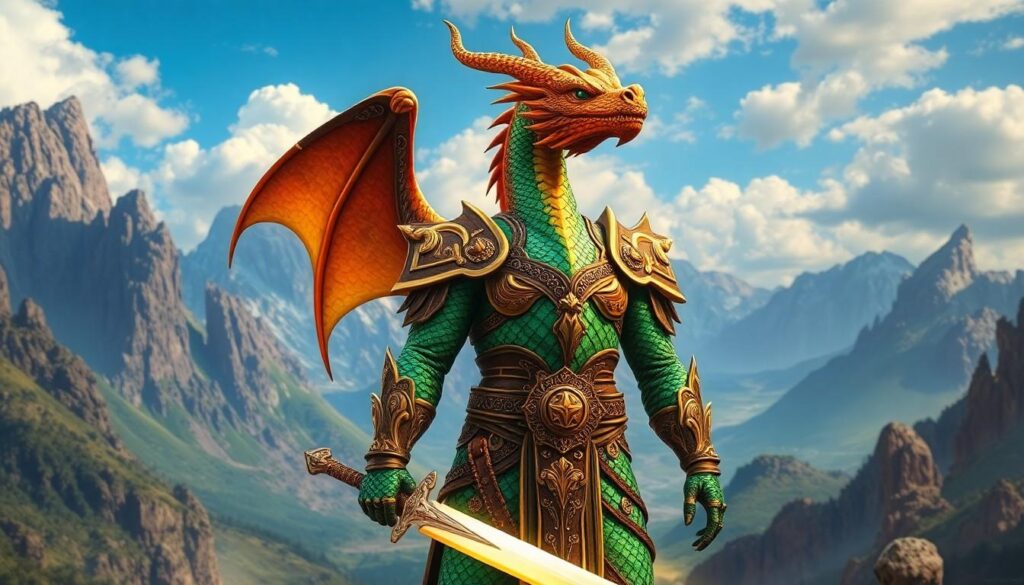Choosing the perfect name for your Dragonborn character can be as epic as the adventures they’ll embark upon. Whether you’re creating a character for Dungeons & Dragons or another fantasy area, a powerful name sets the foundation for your dragon-descended hero’s identity and legacy.
We’ve compiled this comprehensive guide to Dragonborn names to help you breathe life into your character. From traditional clan-based naming conventions to creative inspirations drawn from draconic languages, you’ll find everything you need to create a name that resonates with your Dragonborn’s heritage and personality. Let’s jump into the industry of these proud, scaled warriors and discover how to name them appropriately.
The Origin and Significance of Dragonborn Names
Dragonborn names originate from ancient draconic languages, reflecting their proud heritage as descendants of dragons. Their naming traditions date back thousands of years, with most names consisting of both a personal name and a clan name. Typically, dragonborn parents bestow names that honor ancestors or embody desirable traits like strength, honor, and wisdom.
Clan names hold particular significance in dragonborn culture, often containing references to momentous achievements or legendary ancestors. These family names are worn proudly and passed down through generations, serving as constant reminders of lineage and responsibility. Many dragonborn introduce themselves with their clan name first, followed by their personal name, emphasizing the importance of family bonds.
The phonetics of dragonborn names often incorporate harsh consonants and rolling sounds that mimic draconic speech patterns. Elements like “bala,” “dojun,” and “kriv” frequently appear in traditional names, carrying exact meanings related to draconic virtues. Dragonborn from different regions may adopt naming conventions that reflect local cultural influences while maintaining these core draconic elements.
Gender distinctions in dragonborn naming are subtle but present, with male names often featuring stronger consonant clusters while female names might include more melodic elements. But, many dragonborn names transcend typical gender associations, focusing instead on conveying strength and heritage regardless of the individual’s gender. This practice reflects the dragonborn belief that one’s actions, not gender, determine their worth.
In modern fantasy settings, dragonborn names serve as powerful role-playing tools that instantly communicate a character’s background and values. Names that incorporate elements of their draconic ancestry immediately establish connections to the ancient dragons from which they descended. Understanding these naming traditions helps players create authentic characters whose names resonate with the rich lore of their species.
10 Traditional Male Dragonborn Names and Their Meanings

Traditional dragonborn names carry deep significance, often reflecting qualities valued in their culture such as strength, protection, and nobility. Here are ten powerful male dragonborn names that will give your character an authentic draconic identity:
- Baelthor – This name translates to “Mighty Dragon,” perfect for a character with impressive physical strength or commanding presence.
- Draxis – Meaning “Protector of the Flame,” this name suits a guardian character who defends sacred draconic traditions or literal fire sources.
- Zorath – With its meaning of “Thunderous Heart,” this name works well for passionate, emotional, or storm-affiliated dragonborn.
- Varkoth – Simply meaning “Guardian,” this straightforward name reflects the protective nature many dragonborn embody.
- Adrammelek – This name has Hebrew origins and means “Magnificent King,” ideal for noble-born characters or those with leadership aspirations.
- Arush – Derived from Sanskrit, this name means “Peace” or “Calm,” providing an interesting contrast to the typically fierce dragonborn stereotype.
- Maevnussut – As “Lord of the Fire,” this name connects deeply with the elemental affinity many dragonborn possess.
- Aevnass – Meaning “Gentle Heart,” this name works well for healer characters or those with unexpected compassion.
- Oirsoid – Translated as “The Gifted One,” this name suggests innate magical abilities or exceptional talents.
- Shyrlonay – With its meaning of “Destroyer of Life,” this name has darker connotations suitable for villainous NPCs or characters with troubled pasts.
Ancient Draconic Male Names
Ancient draconic names draw from various industry mythologies and carry the weight of legendary figures. These names connect dragonborn characters to primordial draconic power:
- Apalala – Originating from Buddhist mythology, this Hindi name refers to a powerful water dragon, making it perfect for dragonborn with water affinities.
- Apep – Drawn from Egyptian mythology, this name means “to slither” and belonged to a giant evil serpent, suitable for more sinister or antagonistic characters.
- Ryuu – This straightforward Japanese name simply means “Dragon,” offering an elegant simplicity that crosses cultural boundaries.
- Shesha – From Sanskrit origins, this name means “King of the serpents,” conveying sovereignty and power over lesser reptilian beings.
- Veles – This name comes from Slavic mythology, referring to the god of the underworld, dragons, and trickery, perfect for mysterious characters with complex motivations.
Clan-Inspired Male Dragonborn Names
Clan names represent family lineage and ancestral connections, often incorporating color associations or distinctive characteristics of the clan’s founding dragon:
- Sapphiraktar – This name belongs to the “Blue” dragon clan, suggesting a connection to lightning, storms, and tactical intelligence.
- Thauglorimorgorus – Known as “Black Doom” or the purple dragon clan, this imposing name carries connotations of dark magic and fearsome power.
- Throstulgrael – Associated with the velvet dragon clan, this name suggests refinement and perhaps unconventional draconic traits.
- Voaraghamanthar – Belonging to the “Black Death” dragon clan, this name evokes terror and deadly abilities, suitable for characters with intimidating reputations.
- Vrondahorevos – Known as the “Lightning dance” clan, this name suggests agility, electric affinity, and perhaps a more ever-changing fighting style than typical dragonborn.
10 Powerful Female Dragonborn Names and Their Origins

Female dragonborn deserve names that reflect their innate power and noble heritage. These names combine elements of strength, elemental mastery, and regal authority that perfectly embody the fierce and proud nature of dragonborn females.
- Ignovira – Meaning “flame-born queen,” this Latin-inspired name evokes images of a dragonborn emerging from fire with royal purpose. The combination of “igno” (fire) and “vira” (queen) creates a powerful identity for any female character.
- Ignoraeth – This name translates to “born from eternal fire,” suggesting a dragonborn with an undying spirit and fiery determination. Perfect for characters with connections to fire-breathing dragon ancestry.
- Drakariel – A Greek-inspired name meaning “supreme dragon queen,” Drakariel commands respect through its powerful phonetics and regal connotations. The name sounds authoritative when spoken aloud.
- Solarithra – With Greek origins meaning “ruler of sunlight realms,” this name suits gold or brass dragonborn who have connections to the sun or radiant energy. The flowing syllables create a melodic yet powerful impression.
- Velastria – Latin-derived for “dragon of boundless grace,” Velastria balances power with elegance. This name works well for dragonborn who combine fighting prowess with diplomatic skills.
- Lunorith – A modern creative name meaning “moonlit protector,” perfect for silver or white dragonborn with ties to lunar magic or night-time guardianship. The name carries both mystery and strength.
- Cryovira – Translating to “frozen guardian spirit,” this name suits white or silver dragonborn with frost breath or connections to icy regions. The contrast of “cryo” (cold) with the powerful “vira” creates an interesting ever-changing.
- Abyssithys – Meaning “deep-water guardian,” this name connects to the mysterious depths and suits blue or bronze dragonborn with ties to water elements. The name carries weight and ancient power.
- Norithra – “Dweller of the northern skies” suggests a dragonborn with connections to the northern lands or aerial combat mastery. The name has a crisp, clear sound that cuts through conversation.
- Starmoria – As the “keeper of starry lands,” this name evokes cosmic power and suits dragonborn with connections to divination or celestial magic. The name combines wonder with authority.
Regal Female Dragonborn Names
Regal dragonborn names emphasize nobility, leadership, and commanding presence. These names are perfect for characters from noble bloodlines or those destined to lead.
Drakariel stands out as the quintessential regal name, with its direct reference to dragon royalty. The name flows naturally when spoken and carries an immediate sense of authority.
Velastria combines regality with grace, making it ideal for diplomatic leaders who rule through respect rather than fear. The flowing syllables suggest sophistication.
Solarithra evokes the majesty of the sun itself, perfect for dragonborn who lead with bright, charismatic personalities. The name suggests a ruler whose presence illuminates any room.
Ignovira connects queenship with fire, suggesting a passionate and powerful ruler. This name works exceptionally well for red or gold dragonborn characters.
Lunorith offers a more mysterious regality, suggesting a ruler who governs from the shadows or with quiet wisdom. The name has a contemplative quality while maintaining strength.
Warrior-Inspired Female Dragonborn Names
Warrior dragonborn names emphasize combat prowess, bravery, and battlefield glory. These names suit fighters, paladins, and any character built for conflict.
Eryndith, meaning “bright red warrior” with English origins, evokes blood-soaked battlefields and the fierce determination of a warrior who never retreats. The name’s sharp ending gives it a cutting quality.
Cryovira combines the concept of ice with guardianship, perfect for a tactical warrior who remains cool under pressure. The contrasting elements create a memorable name for any battlefield commander.
Abyssithys suggests a warrior who strikes from unexpected depths, perhaps specializing in ambush tactics or underwater combat. The name carries weight and mysterious power.
Windrenyth, meaning “traveler of endless winds,” suits nimble fighters who rely on speed and mobility. The name itself sounds like movement, evoking images of a warrior who never stays still.
These warrior names combine phonetic strength with meanings that emphasize battle prowess, making them perfect choices for dragonborn characters designed for combat-focused campaigns.
How Dragonborn Clan Names Shape Identity

Dragonborn clan names serve as powerful anchors of identity, reflecting heritage, values, and allegiances within the rich tapestry of D&D lore. These names aren’t merely labels but foundations upon which dragonborn characters build their sense of self and place in the industry.
Major Dragonborn Clans in D&D Lore
The D&D universe features several prominent dragonborn clans that have shaped the cultural industry of these draconic beings. Clan Alarie stands as one of the most powerful dragon clans, wielding important influence across multiple realms. Albertine represents nobility and aristocratic tradition among dragonborn society, maintaining ancient bloodlines with pride. Belarrak has strong ties to the city of Alohull, where their members often hold positions of authority and respect. The Churirajachi clan dominates the political industry of Bodrough, known for their strategic alliances and diplomatic prowess.
Clethtinthtiallor clan members are recognized by their distinctive presence in the city of Curg, where they’ve established deep cultural roots. Daardendrien has built a lasting legacy in Dason, often serving as protectors and leaders within the community. The Linxakasendalor clan brings their unique traditions to Ceehmore, preserving ancient draconic customs through generations. Prexijandilin clan members are respected figures in Eymont, known for their wisdom and connection to draconic magic. Clan Jalt stands apart with its fascinating origin story—founded by exiles who were devoted god-worshipers and wyrm-lovers, they established the village of Ruinspoke as their new home after being cast out from their original communities.
Creating a Unique Clan Name
Crafting a distinctive clan name requires thoughtful consideration of draconic language and cultural elements. Draconic roots provide authentic foundations for clan names, such as “Verthisathurgiesh,” which translates to “Crippled Mountain” in the ancient draconic tongue. Historical significance can elevate a clan name by connecting it to pivotal moments, legendary founders, or sacred locations that resonate with your character’s backstory.
Cultural influences from existing mythologies or fantasy traditions can inspire names that reflect your clan’s core values and origins. Sound and structure play crucial roles in dragonborn naming conventions, with effective clan names typically featuring strong consonants and majestic phonetic patterns. Names like “Alarie” and “Churirajachi” exemplify the distinct sound patterns that convey power and dignity in dragonborn society.
Dragon clan names often precede personal names in formal introductions, symbolizing the pride dragonborn take in their lineage and heritage. Loyalty indicators within clan names might reference allegiances to major draconic deities like Bahamut or Tiamat, immediately communicating fundamental values and potential storylines for your character. We’ve observed that the most compelling clan names balance authenticity with memorability, creating names that both you and your fellow players can easily recall during gameplay while still maintaining the rich, exotic quality expected of draconic language.
Crafting a Dragonborn Name: Step-by-Step Guide

Creating the perfect Dragonborn name doesn’t have to be intimidating. We’ve broken down the process into manageable steps that will help you forge a name worthy of your character’s draconic heritage.
Combining Syllables and Sounds
Dragonborn names thrive on their distinctive phonetic patterns that instantly evoke their draconic ancestry. Multiple syllables form the backbone of these powerful names, creating a rhythm that resonates with their proud heritage. Male Dragonborn names typically incorporate strong, bold sounds that command respect, with examples like Arjhan, Balasar, Bharash, Donaar, and Ghesh demonstrating this powerful quality. Female names maintain the strong draconic feel while sometimes incorporating slightly more melodic elements, though they never sacrifice the inherent strength associated with their lineage.
The construction of these names often relies on meaningful fragments that carry exact connotations within draconic culture. Each syllable can potentially represent an aspect of the character’s personality, abilities, or family history. Experimenting with different combinations allows you to create truly unique names that still sound authentically Dragonborn. Try speaking potential names aloud to ensure they flow naturally and capture the essence of your character’s draconic nature.
Incorporating Character Traits
Your Dragonborn’s name should reflect who they are at their core. Meaningful names often indicate personality, abilities, or clan values that define your character. The name Damaris, for instance, connects to gentle white dragon lineage, while Devin suggests a belief in divine excellence. Ellis indicates a benevolent nature, immediately conveying character disposition through name choice alone.
Clan significance plays a crucial role in name selection as well. The clan name Auguste, for example, suggests a dragon clan favored with good omens, instantly establishing a positive heritage for your character. When crafting your Dragonborn’s name, consider their key personality traits, special abilities, or distinctive physical features that could influence their naming. A Dragonborn known for wisdom might incorporate syllables associated with knowledge, while a fierce warrior might have sounds that evoke strength and power.
The traditional naming format places the clan name first as a sign of respect and honor. For example, in the name Kimbatuul Arjhan, “Kimbatuul” represents the clan while “Arjhan” is the personal name. This ordering immediately establishes the character’s lineage and demonstrates the cultural importance of clan identity. Your character’s full name tells a story about their heritage and personal identity, creating a foundation for rich roleplay opportunities from the moment you introduce yourself at the gaming table.
Regional Variations in Dragonborn Naming Conventions

Dragonborn naming traditions vary significantly across different regions and clans, creating a rich tapestry of cultural identities within their societies. These variations reflect not only geographical differences but also ancestral connections and historical influences.
Chromatic vs. Metallic Influence
Dragon ancestry plays a decisive role in shaping Dragonborn naming conventions. Metallic dragon descendants often bear names that evoke nobility, honor, and positive qualities reflected in their lineage. Names like “Solarius Scalebinder” and “Valorian Goldenscale” showcase the dignified and majestic nature associated with metallic dragons. These names typically incorporate elements that suggest wisdom, protection, and benevolence.
Chromatic dragon ancestry, by contrast, frequently results in names with darker or more aggressive qualities. “Sauron Sunfire” and “Pyrrhus Gildedheart” exemplify the intensity and power that chromatic-influenced names can convey. It’s worth noting that while these names may sound more intimidating, they don’t necessarily indicate evil alignment, as many Dragonborn strive to overcome any negative aspects of their heritage. The distinction primarily serves to honor ancestral connections while establishing a character’s place within draconic lineage hierarchies.
Area-Exact Naming Patterns
Cultural and geographical contexts heavily influence Dragonborn naming traditions across different realms. Names frequently reflect attributes highly valued in Dragonborn society, such as strength, courage, and leadership capability. Terms meaning “mighty,” “brave,” or “bold” appear commonly throughout different regional naming conventions, underscoring universal Dragonborn values.
Dragon lore elements feature prominently in names across various regions, with references to fire, scales, wings, and other draconic characteristics. “Shoutara Frostfang” combines dragon shouts with icy imagery, while “Thu’umara Thunderblade” references both the Voice and lightning strikes. Regional dialects often determine which exact draconic elements receive emphasis in naming practices.
Hard consonants and strong sounds dominate Dragonborn naming conventions regardless of region, reflecting their direct communication style. Short, striking names with guttural tones take precedence over soft, verbose alternatives, creating immediate impact when spoken. This preference for phonetic strength extends across virtually all Dragonborn communities, serving as a unifying element even though other regional variations.
Clan identification receives different emphasis depending on region. Dragonborn typically place clan names first as a mark of honor, though presentation styles vary. The ritzy Dragonborn of Clan Veritas, for instance, favor elaborate and almost pretentious naming structures that immediately signal their prestigious lineage. Other clans might adopt more straightforward naming patterns while still maintaining the traditional clan-first format to honor their heritage.
Modern Approaches to Dragonborn Name Creation

While traditional naming conventions form the backbone of Dragonborn identity, modern approaches offer exciting new possibilities for character creation. Today’s players blend ancient traditions with contemporary creativity to forge names that resonate with their unique vision for their characters.
Pop Culture-Inspired Dragonborn Names
Drawing inspiration from various entertainment sources has become increasingly popular when crafting Dragonborn names. Literary and mythological influences provide rich material for creating names that carry powerful associations and instant recognition. Many players incorporate elements from fantasy novels, video games, and films featuring dragons or reptilian characters. Cultural fusion represents another innovative approach, with players combining phonetic elements from different real-industry languages to create names that sound authentically draconic while reflecting the diverse heritage of the Dragonborn race. This technique allows for names that feel both exotic and familiar, establishing an immediate connection between player and character.
Name Generators and Resources
Finding the perfect Dragonborn name has never been easier thanks to many online tools and resources. Mythopedia offers specialized Dragonborn name generators that create male, female, childhood, and clan names customized to character concepts. Comprehensive lists on sites like Legit.ng and Tuko.co.ke provide over 100 Dragonborn name suggestions, serving as excellent starting points for brainstorming character names. Official D&D Beyond resources list established male Dragonborn names such as Arjhan, Balasar, and Mehen, offering canon-approved options for players seeking authenticity. Custom name fragment tables, like those available on Angelfire, allow players to construct names piece by piece, ensuring each name carries meaningful definitions connected to character traits or backstory elements. These resources help maintain the traditional naming conventions while still allowing for personal expression and creativity.
Avoiding Common Mistakes When Naming Your Dragonborn Character

Clan Name Placement
Dragonborn traditionally place their clan name first as a sign of respect and honor. This practice emphasizes the importance of clan identity over individual identity or even religious devotion. Many new players mistakenly put the personal name first, which goes against core Dragonborn cultural values. Remember that names like “Norixius Donaar” or “Daardendrian Rhogar” follow the proper format with clan name preceding personal name.
Neglecting Cultural Significance
Every Dragonborn name carries meaningful weight within their society. When creating your character, avoid choosing random names without understanding their significance. For instance, names like “Alarie” represent a powerful dragon clan, while “Auguste” indicates a clan favored with good omens. Researching the meaning behind potential names ensures your character feels authentic and connected to Dragonborn heritage.
Inconsistent Naming Themes
Maintaining thematic consistency is crucial when naming your Dragonborn. The phonetic elements should align with established patterns found in traditional names like Verthisathurgiesh or Clethtinthiallor. We often see players mixing vastly different linguistic styles that clash with draconic language patterns. Your character’s name should reflect their exact background, whether they come from a noble lineage like Kepeshkmolik or a warrior clan like Yarjerit.
Overlooking Gender Distinctions
While Dragonborn society places less emphasis on gender compared to clan identity, subtle naming differences still exist. Male names like Balasar, Heskan, and Mehen typically feature stronger consonants, while female names might incorporate more flowing elements while still maintaining draconic strength. Don’t make the mistake of using clearly gendered names from other species that wouldn’t occur naturally in Dragonborn culture.
Excessive Complexity
Dragonborn clan names like Linxakasendalor and Prexijandilin are naturally complex, but creating unnecessarily convoluted personal names can make your character difficult to reference during gameplay. Balance authenticity with practicality by ensuring your Dragonborn’s name can be reasonably pronounced by your fellow players. Consider adding a nickname for table use while maintaining the formal name for character development.
Ignoring Lineage Connections
A common oversight is creating a Dragonborn character without connecting their name to their ancestry. Established clans like Turnuroth, Myastan, and Nemmonis have exact histories and reputations. Your character’s name should reflect whether they belong to a respected ancient lineage, a newer clan, or perhaps a disgraced family seeking redemption. This connection adds depth to your roleplaying experience and creates natural storyline opportunities.
Conclusion: Embracing Your Dragonborn Identity Through Names
Crafting the perfect Dragonborn name is more than just choosing cool-sounding words. It’s about embracing the rich heritage that makes these dragon descendants so compelling in fantasy worlds.
Whether you’ve chosen a traditional clan-first format or blended ancient draconic elements with modern inspirations your name will shape your character’s journey. Remember that the strongest Dragonborn names balance phonetic power with meaningful elements that reflect your character’s values and lineage.
We’ve explored traditional naming conventions metallic versus chromatic influences and regional variations to give you the tools needed for authentic character creation. Now it’s time to forge your own legacy in the area of dragons.
Your Dragonborn’s name is their first roar to the industry. Make it resonate with draconic might and personal meaning.
Frequently Asked Questions
What is the significance of a Dragonborn name?
A Dragonborn name represents their identity, heritage, and legacy in the fantasy world. Names stem from ancient draconic languages and reflect their proud lineage as dragon descendants. A well-chosen name establishes character identity and honors ancestral traditions, making it essential for authentic roleplaying experiences in games like Dungeons & Dragons.
How are traditional Dragonborn names structured?
Traditional Dragonborn names consist of a clan name followed by a personal name. The clan name comes first to emphasize lineage and family importance. Personal names often incorporate harsh consonants and rolling sounds that convey strength, wisdom, or other draconic virtues. This structure highlights the Dragonborn’s pride in their ancestral connections.
Are there differences between male and female Dragonborn names?
Yes, but the differences are subtle. Male names typically feature stronger, bolder sounds, while female names incorporate more melodic elements while still maintaining strength. Both genders’ names emphasize power and heritage rather than having drastically different structures. Examples include Baelthor (“Mighty Dragon”) for males and Ignovira (“flame-born queen”) for females.
What makes a good Dragonborn clan name?
A good clan name reflects heritage, values, and allegiances. It should incorporate draconic language elements, have a powerful sound structure, and possibly reference connections to major dragon deities. Clan names like Sapphiraktar (Blue dragon clan) or Clan Alarie effectively convey lineage and cultural significance while creating roleplaying opportunities.
How do I create my own unique Dragonborn name?
Start by determining your character’s draconic ancestry (metallic or chromatic). Choose meaningful fragments that reflect character traits and abilities. Incorporate distinctive phonetic patterns with strong consonants and rolling sounds. Follow the traditional format with clan name first, then personal name. Consider regional variations and cultural influences to enhance authenticity.
What are some regional variations in Dragonborn naming?
Regional variations occur based on geographical differences and historical influences. Names from metallic dragon ancestry often evoke nobility and honor, while chromatic-influenced names convey intensity and power. Mountain-dwelling clans might have harsher, more guttural names, while those from coastal regions may incorporate more flowing sounds reflecting their environment.
Can I blend modern elements into Dragonborn names?
Yes, modern approaches often blend traditional conventions with contemporary creativity. Many players draw inspiration from pop culture, fantasy novels, video games, and films. Cultural fusion is increasingly popular, combining phonetic elements from various languages to create unique names that feel both exotic and familiar while maintaining draconic essence.
What common mistakes should I avoid when naming my Dragonborn character?
Avoid neglecting cultural significance, creating inconsistent naming themes, or overlooking subtle gender distinctions. Always place clan names first to honor lineage, ensure names reflect appropriate ancestry connections, and keep personal names from becoming excessively complex for practical gameplay purposes. Respect the draconic linguistic patterns for authenticity.
How important is the meaning behind a Dragonborn name?
Very important. Dragonborn names typically carry specific meanings that reflect qualities valued in their culture, such as strength, wisdom, honor, or magical affinity. Names like Draxis (“Protector of the Flame”) or Solarithra (“ruler of sunlight realms”) connect characters to specific traits and create roleplaying opportunities that enrich storytelling experiences.
Are there online resources to help create Dragonborn names?
Yes, numerous online name generators and resources specifically designed for Dragonborn characters exist. These tools can provide inspiration while maintaining traditional elements. D&D forums, wikis dedicated to fantasy naming conventions, and official sourcebooks all offer guidance for creating authentic Dragonborn names that balance tradition with personal expression.







